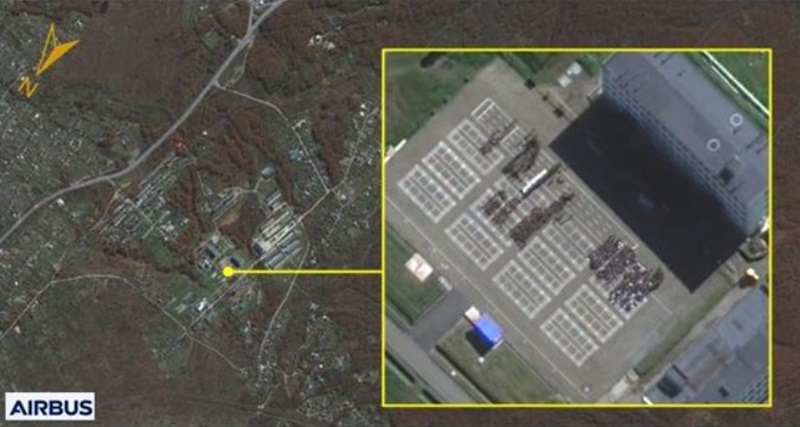[Editorial]
Reports of North Korea’s large-scale troop deployment to Russia have been confirmed. The National Intelligence Service, South Korea’s spy agency, announced on October 17, “North Korea has decided to send a total of 12,000 troops, including special forces, organized into four brigades to the war in Ukraine, and the movement of troops has already begun.”
South Korea’s President Yoon Suk Yeol convened an emergency security meeting in response. The Presidential Office stated, “The current situation, where the close military cooperation between Russia and North Korea has escalated into troop deployment, poses a significant security threat not only to our country but also to the international community.”
Ukrainian President Volodymyr Zelensky also said on October 17, “North Korea is preparing around 10,000 troops to fight on the side of Russia against Ukraine, and some North Korean officers have already been deployed to territories temporarily occupied by Russia.”

North Korea’s decision to not only supply weapons such as shells and ballistic missiles but also deploy large-scale troops to the battlefield is an illegal act of participation in war, violating international law.
This dangerous provocation, which could destabilize the international security order, must be withdrawn. Notably, this deployment follows the agreement between North Korean leader Kim Jong-un and Russian President Vladimir Putin in June to restore the “North Korea-Russia Military Alliance Treaty.”
The new treaty’s Article 4 includes a clause for “automatic intervention in case of emergency,” stipulating that one party will provide necessary assistance, including military aid if the other is attacked. Russia, which has been falsely claiming that “the West caused the war,” may have used the false argument as justification for North Korea’s troop deployment.
North Korea’s participation in the war in Ukraine puts it in the ranks of war criminals under international law. In February last year, the United Nations General Assembly passed a resolution overwhelmingly supported by member states, calling for Russia’s unconditional and immediate withdrawal from Ukraine. The International Criminal Court (ICC) also issued an arrest warrant for President Putin in March of the same year on charges of war crimes.
The military closeness between North Korea and Russia is also a critical threat to South Korea’s security. The Russian Foreign Ministry, without verifying the facts, hastily blamed South Korea for the appearance of a drone over Pyongyang’s airspace, labeling it a “provocative action” and openly declaring that it would provide military assistance if North Korea is attacked.
Speculation is emerging that, in exchange for the deployment of North Korean troops, Russia has agreed to provide North Korea with reconnaissance satellites, nuclear-powered submarines, and nuclear weapons technology. Most concerning is the fear that North Korean forces, through their participation in modern warfare since the Korean War, will enhance their combat capabilities.
International pressure may also grow for the South Korean government to begin providing lethal weapons to Ukraine, a request it has thus far refused.
Since blowing up the inter-Korean connection roads along the Gyeongui and Donghae Lines, North Korean leader Kim Jong-un has repeatedly threatened, showing a map of operational plans for Seoul and stating, “If our sovereignty is violated, we will use force without hesitation.”
North Korea’s provocations must be met with strengthened international sanctions. While the United Nations Security Council’s sanctions panel on North Korea has been suspended since May due to Russia’s irresponsible use of its veto, there is a glimmer of hope.
On October 16, a “Multinational Sanctions Monitoring Team (MSMT)” was established, composed of 11 countries, including the United States, the United Kingdom, France, Germany, Japan, and Australia. Efforts should be made to minimize any gaps in monitoring North Korean sanctions through coordination with allied countries.
The National Intelligence Service, along with the Ministry of National Defense and the Ministry of Foreign Affairs must closely track the trends of North Korea-Russia military cooperation. South Korea should emulate the intelligence capabilities of Israel’s Mossad, which has protected the country’s security despite its geographic isolation. We hope to see a multifaceted diplomatic and military intelligence cooperation effort with Ukraine, the United States, and NATO, as well as with other relevant countries.



![Green card interviews used as decoy for ICE arrests U.S. Immigration and Customs Enforcement (ICE) agents arrest a man after a hearing at an immigration court in Manhattan, New York, on Oct. 27. [REUTERS]](https://www.koreadailyus.com/wp-content/uploads/2025/12/1226-ICE-100x70.jpg)
